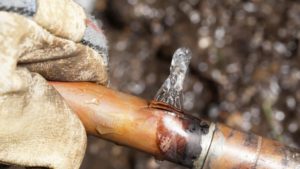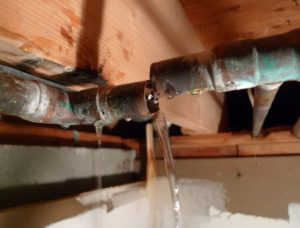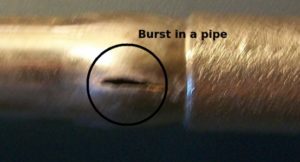 Frozen water pipes can occur during the winter months when temperatures drop below freezing. They are particularly common during periods of high wind. Homes that are currently unoccupied are also at risk of having their pipes freeze, simply because there is no heat running through the ventilation system next to the pipes to help keep them from getting too cold.
Frozen water pipes can occur during the winter months when temperatures drop below freezing. They are particularly common during periods of high wind. Homes that are currently unoccupied are also at risk of having their pipes freeze, simply because there is no heat running through the ventilation system next to the pipes to help keep them from getting too cold.
Unfortunately, when water pipes freeze, the damage can be extensive. If you live on Long Island, where freezing temperatures are common, it might be difficult to find an available plumber to make any necessary repairs during a cold snap since they may already be helping other customers. Having to wait to restore running water to your home can leave you in a real bind. The best way to avoid this problem is by taking steps to prevent and fix frozen water pipes during the winter.
If the weather forecast is calling for exceptionally low temperatures, you should leave all of your faucets dripping. This is particularly important for any faucets that get their water supply from pipes that are not well-protected from the weather. Water is much less likely to freeze when it is in motion. The slow drip can keep the water in the pipes moving enough that it won’t freeze.
Before winter hits, be sure to turn off the water supply to any outdoor faucets. Don’t forget to turn on the faucet after the main water supply has been cut off to remove any excess water from the pipes. The expanding and contracting motion of water that occurs when it freezes can cause the pipe to burst. Neglecting to turn off the water outside is one of the most common issues that people run into when springtime rolls around.
Any plumbing that runs through cabinets that are located on the outer walls of your home can be protected by opening the cabinet doors during periods of extremely cold weather. When the cabinet doors are closed, it is harder for heat to get into the space. As a result, the pipes may freeze. Opening up the cabinet doors can allow heat from your home to penetrate the space, helping to prevent frozen pipes.
Proper insulation is essential. All exposed plumbing should be covered with insulating sleeves or pipe tape. It is best to do this before winter strikes. Otherwise, you may have trouble finding pipe insulation in stock. Usually, when the first freeze happens, stores sell out quickly with everyone rushing to protect their pipes. Insulating your pipes in the fall is the best way to ensure that they will be properly protected.
If you are going to be gone for an extended period of time during the winter, you should plan ahead to avoid any problems. Use a programmable thermostat to maintain the temperature inside your home. Additionally, consider asking a neighbor to check in on your property periodically to make sure that the heating system is still working. The last thing that you want is to come home to frozen pipes.
If your pipes do freeze, there are some steps that you can take on your own while you are waiting for a plumber to get to your property. Start by increasing the amount of heat in the room. If you have a space heater available, you can direct it toward the frozen pipes.
Rather than waiting until there is a problem, however, it is much better to be proactive. Using all of the tips in this article, you should be able to keep your pipes from freezing no matter how cold it gets this winter.

 Even a small plumbing leak has the potential of becoming a disastrous issue. Many people think of plumbing leaks as a dripping faucet or a small drip located under the sink. Although these leaks are annoying, most people do not worry about fixing them; however, these small issues can become a catastrophic issue if you do not deal with it quickly and properly.
Even a small plumbing leak has the potential of becoming a disastrous issue. Many people think of plumbing leaks as a dripping faucet or a small drip located under the sink. Although these leaks are annoying, most people do not worry about fixing them; however, these small issues can become a catastrophic issue if you do not deal with it quickly and properly. No homeowner on Long Island ever wants to have to deal with burst plumbing pipes. However, unfortunately, it is all too common for pipes to burst, which causes serious damage and flooding.
No homeowner on Long Island ever wants to have to deal with burst plumbing pipes. However, unfortunately, it is all too common for pipes to burst, which causes serious damage and flooding.